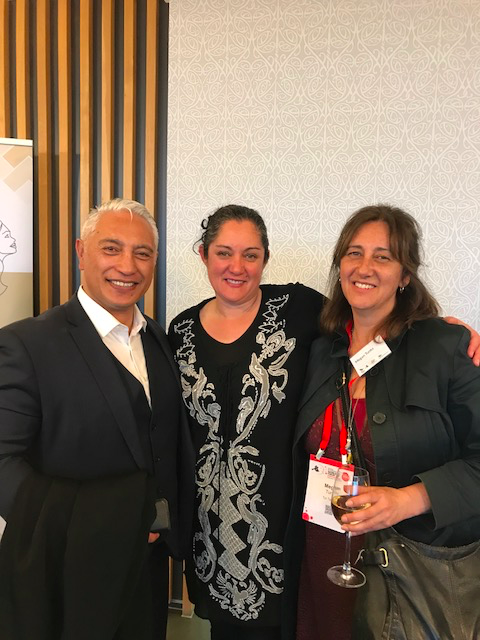
13 Dec The Social Enterprise World Forum 2017
The Social Enterprise World Forum (SEWF), which ran from 27-29 September, was an international event for social enterprises from all over the world to come together, share wisdom, build networks and discuss how to create a more sustainable future. This year, the event was held in Christchurch and attracted a wide range of people from social enterprise practitioners, social entrepreneurs, to policy makers, community leaders, investors, activists, academics, and more from all around the globe.
The conference provided a range of memorable experiences. It was wonderful to experience a conference of this size in New Zealand, and in such a beautiful venue – following its restoration after the 2011 earthquakes. It was great to see the progress around the city, as participants moved through venues dependent on the break-out sessions.
Social enterprises play an important role in building healthy communities – they reduce poverty, build food systems, celebrate diversity, promote Indigenous culture, meet health needs, create employment opportunities for those with barriers, deliver community owned energy and address environmental issues, economic inequality and social exclusion.
Social enterprise can be viewed as a tool to build healthy communities and vibrant local economies – and SEWF provided opportunities to enhance knowledge and skills, build a supportive public policy environment, and create a generous network of collaboration and sharing while also examining transferrable strategies, systems and models that have worked in the past, while also turning toward the future to explore emerging market opportunities in the long-term.
The theme for SEWF 2017, “Ka koroki te manu – Creating our tomorrow”, was an invitation to create a global legacy of positive change and to take an active role in shaping the world’s future. Just as the first birdsong welcomes the potential of tomorrow, SEWF 2017 provided an opportunity to come together and explore the endless possibility in ours.
There were a great many opportunities to meet with many fellow Māori bursars, including the indigenous networking event at the new Ngai Tahu Corporate offices. The two minute business pitches at the networking event was a new format to observe in action.
There were also quite a few stand out sessions, including the Kaupapa Māori Values contributing to Social Enterprise presented by Dr Ella Henare. She set the scene for the panel by identifying key kaupapa Māori values for social enterprise which included whanaungatanga, wairuatanga, kaitiakitanga, manaakitanga, kotahitanga, and tino rangatiratanga. While all the panelists were inspiring, Levi from Patu Aotearoa really resonated, describing the origins of Patu from big boys and gang culture. The social change which has been achieved from a gang chapter to a fitness chapter, with branches across the country is a great and inspiring outcome.
Another panelist Saasha McMeeking also resonated identifying businesses, such as Patu, which were mission integrated, creating social change and creating impact, to those at the other end of the social enterprise spectrum, which were identified as mission separate, such as the Go Bus economic initiative funded by Ngai Tahu and utilised to use income to leverage assets to fund tribal development.
On another level, the word disruption was one heard a lot. It was used in a variety of contexts by speakers including as a driver of change and technology, social change with an institution, a way to acknowledge both the old and the new ways of doing things, and to understand systemic failures and learnings.
Another speaker who struck a chord was Andrea Chen who spoke about Social Enterprise in Recovery and Regeneration. Andrea provided examples of her organisation, Propellor, in New Orleans. The organisation is a not for profit that grows and supports entrepreneurs to tackle social and environmental disparities with initiatives put in place following the damage caused by the floods in New Orleans.
‘Propellor aims to build a critical mass of small businesses working to tackle disparities in food, water, health and education. These were areas identified as those with significant inequities, and opportunities for local social enterprise businesses to implement solutions.’
Andrea identified that while a number of initiatives had been developed, equity indicators identified that system change was needed to work towards combating the growing inequality and inequity gap between afro American and white/Asian Americans. She also went on to identify expectations of true impact, identifying what our theory of change is, how we know it is working, what our impact model might be and how we create impact, what the evidence is for this, and how to truly understand social value.
The topic of disruption highlighted a few key areas for Toi Tangata, confirming we are on the right track in looking at smarter ways to deliver activities and improving our digital literacy skills.
Key take homes included Impact Narratives and the need to up the ante in collecting evidence through storytelling and advocacy, as well as looking more into theories of change. Another highlight was the Employers of Tomorrow session which included a panel who identified the impacts of automation, globalisation, and need for flexibility. Work and the way we do it is not linear any more. It was also highlighted that there should be more business for good as a source of transformation and the importance of standing by values and delivering quality services- which is something we are proud to achieve at Toi Tangata and intend to continue.
Attending the SEWF was a great experience and has shown that looking forward, there is an urgent need for more digital literacy workforce development opportunities and the development of Social Value and Impact measures. To keep up this momentum, there must be more opportunities for Maori bursars to come together in either a face to face or digital forum because collectively, we can instigate great change.



